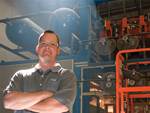Medical Device Nabs Thermoforming Award
A thermoformed medical device from Ray Products won first place in the Heavy-Gauge, Pressure-Formed category at the SPE Thermoforming Div. annual parts competition, held recently in Atlanta.
A thermoformed medical device from Ray Products won first place in the Heavy-Gauge, Pressure-Formed category at the SPE Thermoforming Div. annual parts competition, held recently in Atlanta. The winning project was developed for a DNA sequencer about the size of a desktop printer. The device enclosure incorporated complex shapes, undercuts, and deep draws. Such features can be achieved only with CNC-machined, water-cooled aluminum tooling—the only type of molds that Ray Products uses for pressure forming, says Jason Middleton, Ray’s v.p. of sales and development.
The original project called for quantities of 75 to 100 units/yr. Pressure forming with Ray Products allowed the client to develop an aesthetically pleasing and RoHS-compliant enclosure without the high tooling costs of injection molding. It also allowed the OEM to bring its product to market months faster than injection molding would allow, says Middleton. In a rapidly evolving market like biotechnology, shorter time to market is a significant competitive advantage.
The multi-part enclosure was pressure formed at Ray Products’ ISO 9001:2008 certified manufacturing facility in Ontario, Calif., using UL 94V-0 flame-retardant material. After being pressure formed, each piece was trimmed by the company’s six-axis robots. Then, each part was painted and coated with EMI/RFI shielding at Ray Products’ in-house painting facilities. Some parts were also silk-screened.
Related Content
-
Origin Materials Unveils CapFormer for Producing PET Caps
Factory acceptance test completed at commercial scale.
-
A Processor's Perspective: What's Driving Growth in Heavy-Gauge Thermoforming
Key factors for the progress are innovative materials, advanced automation and precision engineering.
-
Automation in Thermoforming on the Rise
Equipment suppliers’ latest innovations exemplify this trend driven by factors such as labor shortages, higher-speed thermoformers and tighter quality control.












